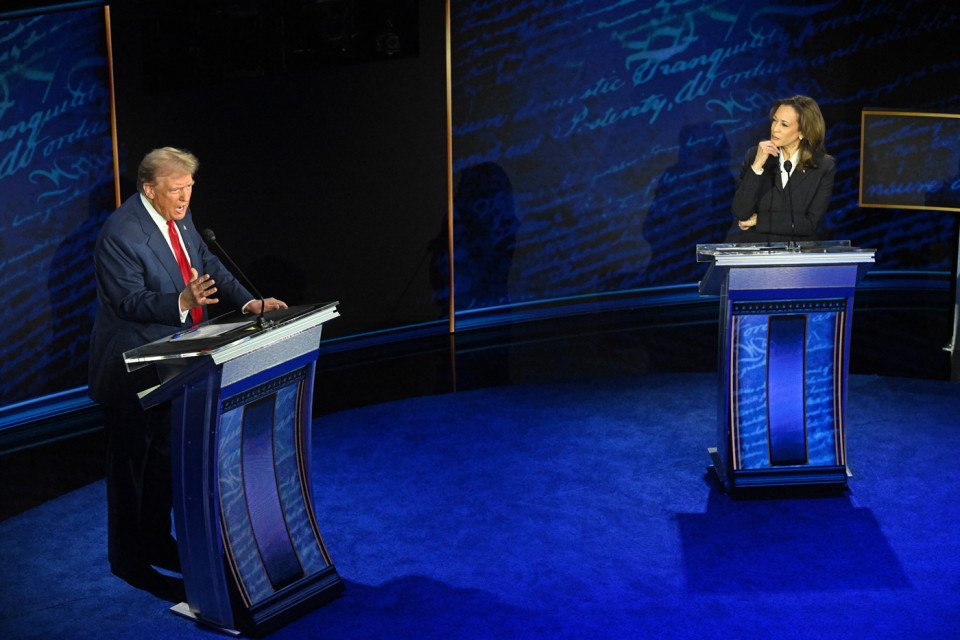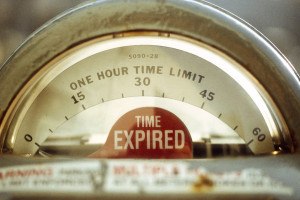Philadelphia Once Again the Setting for a Signature Moment in a Historic Presidential Race
Behind the scenes of the big debate where Kamala Harris established herself as a force to be reckoned with and Donald Trump re-confirmed that he's not a serious person.

Vice President Kamala Harris listens as former President Donald Trump speaks during last night’s presidential debate at the National Constitution Center. / Photograph by Saul Loeb /AFP via Getty Images
“In Springfield, they’re eating the dogs,” former President Donald Trump said on national television on Tuesday night. “The people that came in. They’re eating the cats. They’re eating — they’re eating the pets of the people that live there.”
No, Trump wasn’t joking. He was deadass serious. In the very same building where then-candidate Barack Obama delivered “A More Perfect Union,” his iconic speech on race in 2008, a moment that many say defined that historic presidential race, Donald Trump wielded a trope about immigrants eating pets.
At the first Presidential Debate between Trump and Vice President Kamala Harris at the National Constitution Center, the former was spreading a recent and baseless theory that Haitian immigrants had been eating pets in Springfield, Ohio. Beyond the xenophobic undertones of his remarks, there was a cringy, secondhand embarrassment that could be instantly felt in the moment. I was covering the event a few blocks away at the Pennsylvania Convention Center where I listened to political surrogates advocating for both candidates in the “spin room” all night.
The atmosphere of the Convention Center was anxious, combative, fiery, and intense.
Hundreds of reporters from across the country flocked to the room where dozens of politicians were trying to make the case for both candidates during the debate. Notable Harris backers in the spin room were governors Josh Shapiro, Gavin Newsom, and Roy Cooper. Big-name Trump supporters in the building were senators Tim Scott, Tom Cotton, Marco Rubio, and VP candidate JD Vance. Even Robert F. Kennedy Jr. was on hand.
To describe the scene as a frenzy is an understatement. The polarized talking points lobbed across the aisle were endless. But the pandemonium only intensified after the debate when the Secret Service increased the buffer space between the press and the next “important figure” about to enter the spin room.
I was able to make it to the front of the railing in the chaos. We got a quick glance of a tall man in a dark suit and big red tie walking to the front. Within seconds, a stampede of cameras and mics descended like a pack of wolves on fresh meat.
It was the big man himself, Donald Trump, addressing the spin room post-debate. He was instantly swarmed by reporters who hurtled questions at him left and right. He’s clearly a natural at engaging loud press crowds in front of him. He looked a little tired, his face a bit sunken, but energized enough to try to give the press a “show.” Repeatedly, he made his point that he’d “won” the debate and ranted about his attacks on Harris’s ability to beat him in less than 60 days at the November 5th general election.
I left the Convention Center at close to midnight, still fascinated that voters may be split between Harris and him.
Throughout the debate, the contrasts between the candidates couldn’t have been more clear.
On the issue of reproductive rights, Trump wouldn’t commit to vetoing a national abortion ban while Harris declared she would. Trump continued to lie about losing the 2020 election, continued to question Harris’s undeniable Black identity, fear-mongered about immigration, and was a persistent negative Nancy about the future of America. At a certain point, it began to feel like a broken record of whining, bickering, and ego trips, with Trump defending the size of his rally crowds and brushing away his criminal charges as political retribution. To Harris’s credit, she obviously and successfully baited him this unhinged behavior.
For 90 minutes, voters watched a reasonable woman debate an immature man who is clearly (still) unfit to hold office. Harris eviscerated Trump on Tuesday night—but the polls still have him looking like a formidable contender in a race where, the debate showed, he appears way out of his league. Is anybody really undecided at this point. Is it truly a hard choice between two polar opposite candidates right now?
At this point, such indecisiveness doesn’t feel genuine unless there are reasons that have nothing to do with the actual merits of the candidates’ campaigns. While some voters have argued they would like to know more about how Harris plans to implement her policies and have expressed frustration with the economy under the Biden administration — did her opponent give anyone the impression that he’d be better equipped to address these concerns? Trump’s erratic behavior has arguably made it harder for him to focus on the legitimate issues impacting voters (and even to aggressively challenge Harris on issues on which outpolls her, like the economy and immigration), serving as a constant distraction to both his own campaign and the public’s faith in politics.
So why is Trump being given so much grace from undecided voters at this point?
I think it’s time to have tough conversations with the self-proclaimed undecided voters in our lives who should be honest about the personal biases shaping their inability to choose a candidate. If their views align with Trump and they fear public judgment, they need to own it — same for closet Harris supporters. But continuing to treat this election like a tough quiz — given the obvious night-and-day nature of the candidates, their policies, and their temperaments — is as much of a joke as those viral CNN panels with “undecided” voters.
If even Taylor Swift, a global celebrity with a bipartisan fanbase can immediately make her decision following that chaotic debate, there should be no reason why the rest of us can’t.
As my Uber rode past the National Constitution Center later that night, I thought back to March 18, 2008, when Obama gave his campaign-defining speech, one that foreshadowed a history-making election later in the year. Could the same be true once again? Would what transpired at the National Constitution Center on Tuesday night be another defining moment in American politics?
If what happened in Philly 16 years ago was the sign of true change many hoped it would be, perhaps the answer is yes once more.


